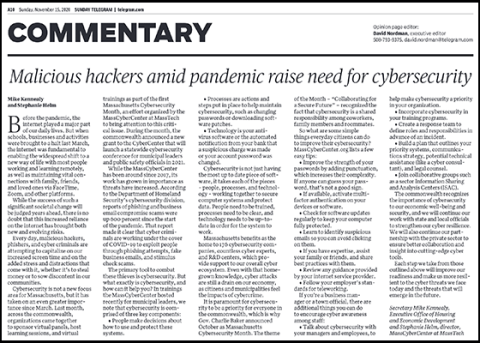Column from Housing and Economic Development Secretary and MassCyberCenter Director Stephanie Helm highlights importance of maintaining cybersecurity resilience during the pandemic
Stephanie Helm, director of the MassCyberCenter at MassTech, and Housing and Economic Development Secretary Mike Kennealy, co-authored a column that appeared in The Worcester Telegram & Gazette on how we must remain vigilant against the increased threat of cybersecurity attacks during the pandemic. The column ran on Sunday, November 14th. Read the full piece on Telegram.com or below.

Op-Ed by: Mike Kennealy and Stephanie Helm

Before the pandemic, the internet played a major part of our daily lives. But when schools, businesses and activities were brought to a halt last March, the internet was fundamental to enabling the widespread shift to a new way of life with most people working and learning remotely, as well as maintaining vital connections with family, friends, and loved ones via FaceTime, Zoom, and other platforms.
While the success of such a significant societal change will be judged years ahead, there is no doubt that this increased reliance on the internet has brought both new and evolving risks.
Every day, malicious hackers, phishers, and cyber criminals are attempting to capitalize on our increased screen time and on the added stress and distractions that come with it, whether it’s to steal money or to sow discontent in our communities.
Cybersecurity is not a new focus area for Massachusetts, but it has taken on an even greater importance since March. Last month, across the commonwealth, organizations came together to sponsor virtual panels, host learning sessions, and virtual trainings as part of the first Massachusetts Cybersecurity Month, an effort organized by the MassCyberCenter at MassTech to bring attention to this critical issue. During the month, the commonwealth announced a new grant to the CyberCenter that will launch a statewide cybersecurity conference for municipal leaders and public safety officials in 2021.
While the MassCyberCenter has been around since 2017, its work has grown in importance as threats have increased. According to the Department of Homeland Security’s cybersecurity division, reports of phishing and business email compromise scams were up 600 percent since the start of the pandemic. That report made it clear that cyber criminals are working under the cover of COVID-19 to exploit people through phishing attempts, fake business emails, and stimulus check scams.
The primary tool to combat these thieves is cybersecurity. But what exactly is cybersecurity, and how can it help you? In trainings the MassCyberCenter hosted recently for municipal leaders, we note that cybersecurity is comprised of three key components:
- People make decisions about how to use and protect these systems.
- Processes are actions and steps put in place to help maintain cybersecurity, such as changing passwords or downloading software patches.
- Technology is your anti-virus software or the automated notification from your bank that a suspicious charge was made or your account password was changed.
Cybersecurity is not just having the most up to date piece of software, it takes each of the pieces - people, processes, and technology - working together to secure computer systems and protect data. People need to be trained, processes need to be clear, and technology needs to be up-to-date in order for the system to work.
Massachusetts benefits as the home to 176 cybersecurity companies, countless cyber experts, and R&D centers, which provide support to our overall cyber ecosystem. Even with that homegrown knowledge, cyber attacks are still a drain on our economy, as citizens and municipalities feel the impacts of cybercrime.
It is paramount for cybersecurity to be a priority for everyone in the commonwealth, which is why Gov. Charlie Baker announced October as Massachusetts Cybersecurity Month. The theme of the Month – “Collaborating for a Secure Future” – recognized the fact that cybersecurity is a shared responsibility among coworkers, family members and roommates.
So what are some simple things everyday citizens can do to improve their cybersecurity? MassCyberCenter.org lists a few easy tips:
- Improve the strength of your passwords by adding punctuation, which increases their complexity. If anyone can guess your password, that’s not a good sign.
- If available, activate multi-factor authentication on your devices or software.
- Check for software updates regularly to keep your computer fully protected.
- Learn to identify suspicious emails so you can avoid clicking on them.
- If you have expertise, assist your family or friends, and share best practices with them.
- Review any guidance provided by your internet service provider.
- Follow your employer’s standards for teleworking.
If you’re a business manager or a town official, there are additional things you can do to encourage cyber awareness among staff:
- Talk about cybersecurity with your managers and employees, to help make cybersecurity a priority in your organization.
- Incorporate cybersecurity in your training programs.
- Create a response team to define roles and responsibilities in advance of an incident.
- Build a plan that outlines your priority systems, communications strategy, potential technical assistance (like a cyber consultant), and legal counsel.
- Join collaborative groups such as a sector Information Sharing and Analysis Centers (ISAC).
The commonwealth recognizes the importance of cybersecurity to our economic well-being and security, and we will continue our work with state and local officials to strengthen our cyber resilience. We will also continue our partnership with the private sector to ensure better collaboration and insight into cutting-edge cyber tools.
Each step we take from those outlined above will improve our readiness and make us more resilient to the cyber threats we face today and the threats that will emerge in the future.
Secretary Mike Kennealy, Executive Office of Housing and Economic Development and Stephanie Helm, director, MassCyberCenter at MassTech
